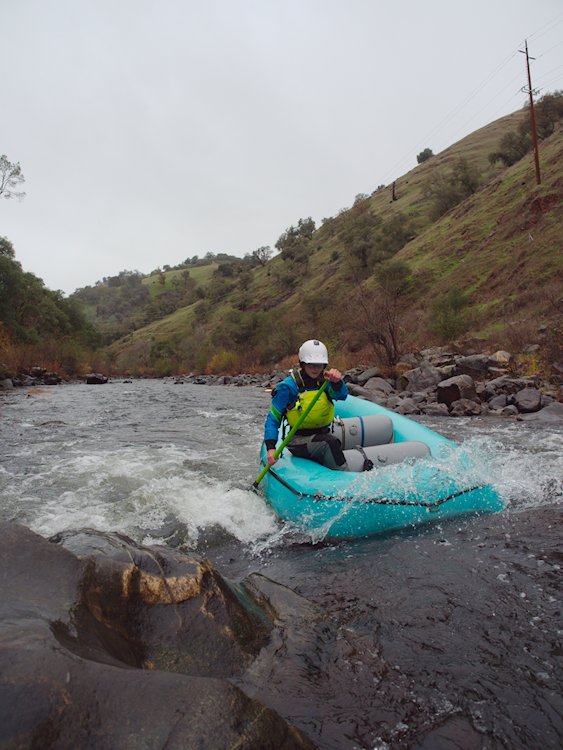Welcoming Beginners – Start Slowly
In rafting we often have a very short window to welcome beginners into the sport. Summer and early fall months are often warm and inviting enough to help people get started without too much equipment. Unfortunately, this means that we have a tendency to rush people into higher class whitewater or overload them with information, but for beginners we have to remember that we need to start slowly. If it takes 10,000 hours to achieve mastery and a beginner might only get 1000 hours for their first few seasons of boating thus it could take them 10 years to achieve mastery. In a normal job in the US, we put in about 2000 hours per year so it would take a new boater 4 years to achieve the same mastery level that someone in a regular 9 to 5 job would achieve in 2. This can be a very frustrating situation for experienced boaters and guides when they bring some one new into the sport as someone may seem to be progressing more slowly than we would like. So how do we work within these constraints to help new paddlers progress?
Task Saturation in the Outdoors
There are a couple of issues that new boaters face and specifically task saturation affects new boaters badly. Task saturation, also known as cognitive overload or information overload, refers to a state in which an individual is overwhelmed by the amount of information, tasks, or stimuli they are trying to process, leading to decreased performance, increased stress, and decreased ability to make informed decisions.
There is a lot that can overload less experienced boaters from logistics, to packing trips, to decision making on the river. This may seem familiar, but when someone experiences task saturation it often looks like this:
Reduced Performance: Trying to manage too many tasks or pieces of information simultaneously can lead to a decline in overall performance. The boater’s ability to read water, decision-making ability, and attention to detail may all suffer. This manifests as plowing haphazardly into rocks, equipment not getting rigged, or the boater shutting down in the middle of a rapid.
Increased Stress: Being constantly overwhelmed can lead to heightened stress levels. The brain's resources are strained, and the individual may feel a sense of urgency, anxiety, or pressure due to the inability to keep up with everything. This forces the boater to take cognitive short cuts of ignoring work like not rigging in, in ability to focus, lack of a sense of urgency in an urgent situation, or too much urgency when the situation doesn’t call for it.
Impaired Decision Making: When less experienced paddlers are overloaded with information, they will struggle to make solid decisions. They might resort to hasty choices or even avoid making decisions altogether to alleviate the cognitive load. This leads to freezing up in rapids, making choices that negatively impact the group, or lack of communication as to what they are about to do.
Memory Issues: Cognitive overload can lead to difficulties in retaining and recalling information. Too much information at once can make it challenging to remember important details. This makes the boater suffer when you are debriefing or discussing some negative event like a flip or a wrap. They might also just flatly not remember any part of the trip at all.
Decreased Creativity: Running rapids requires the creativity to put a puzzle together. Elements of the craft, the flow, the rapid, the crew, and overall paddle power have to be estimated and analyzed creatively to find a solution that will get you down the river. Creativity requires mental space and the ability to connect ideas in novel ways. Task saturation can hinder this creative thinking process by taking that logical process and forcing it to become an emotional process eliciting fear as a response rather than creative thinking.
Burnout: Prolonged exposure to high levels of cognitive overload can contribute to burnout, resulting in physical, emotional, and mental exhaustion due to chronic stress. The effects of burnout are lower motivation to paddle, leaving boating, and demoralization in paddlers.
In essence, task saturation is a phenomenon that can have significant impacts on an individual's well-being and performance. The biggest piece of advice that you can implement is to start slowly and don’t overwhelm beginners in boating. So let’s look at some ways that you can help your fellow boaters who experience task saturation. It is important to remember that task saturation can happen in the moment or it can happen more generally, but we want to look at strategies for dealing with both issues.
Going Slow to Avoid Acute Task Saturation
Logical Processing: Try to make everything a logical process and use tools to think through it. Beginners may not have the tools or skills to make informed decisions in stressful situations. They also may know of a tool, but lack of mastery means that beginners can fall apart when called upon in a stressful situation. As a beginner you need to seek out training opportunities and as an experienced boater you need to make sure you are helping beginners work through their skill tool kit so they stay focused on solving the problem rather than giving into fear and freezing up.
Prioritization: Identify the most important tasks and focus on them first. Use techniques like taking time to explain and prioritize tasks for beginners to help them understand what is important and what can wait. Remember you have to go slow and potentially explain the order of operations several times before beginners get it.
Information Filtering: Use tools and techniques to filter and organize incoming information. As a beginner you may need to ask more experienced boaters to filter information for you so you can understand what is important and what is not.
Breaks: Regular breaks during trips can help refresh people’s mind and body by allowing them a moment away from the chaos in their mind. No one can maintain a high stress level for very long so you need to specifically break that time up so they can reduce the stress they are feeling.
Single-tasking: Studies show that as a species we suck at multitasking especially in stressful environments…you know the old fight or flight response. As a beginner you have to focus on one task at a time. This will improve the quality of work and reduce cognitive strain. Experienced boaters hate this though, so as a beginner you may need to ask them to have patience, and as an experienced boater you need to practice having patience and realizing that beginners must be singularly focused. This will make certain things slower, but allow beginners to complete a task and they will create a much better mental foundation.
How to maintain progression
Often times when we go slow it can feel like we are going too slow or that there is too little progression many times this is felt on the part of an experienced boater, but sometimes this affect is felt by the beginner. It’s important to talk to beginner boaters to understand if you are moving to fast or slow, however as an experienced boater you can work on a learning strategy to make this easier:
Build Skill Foundations: There are several foundations of paddling that beginners need to know, but having tools like rigging plans, check lists, and having skill sessions for paddling helps build foundations that beginners need to thrive.
Time Management: Break tasks into smaller, manageable chunks and allocate specific time periods for each. This helps prevent feeling overwhelmed by trying to tackle everything at once. As a beginner boater you need to focus on managing your time and asking more experienced boater what you should be doing if you don’t know what to do.
Learn to Say No: It's important to set boundaries and not take on more tasks than you can realistically handle. As a beginner you will need to communicate when you are unable to take on more responsibility. Experienced boaters should also see to it that beginner boaters aren’t just saying yes to everything and they are being guided to the proper task.
Inspect what you Expect: Experienced boaters should not just assign a task and expect that it is done properly. This can lead to beginner boaters feeling like they are failing. Similarly, you need to inspect the completion of the tasks you have assigned to new boaters so that you can coach them on the spot (which helps build more confidence) and it avoids feeling so failure on both sides.
Plan training sessions each trip: Planning a short training session can help break up the anxiety of the day and help prevent task saturation because it changes the focus of the day from downriver progress to learning goals. Beginners will feel like there is an opportunity to learn, but more importantly there is an opportunity to fail in a controlled low risk environment.
Have empathy: Finally, just remember to have a little empathy for your fellow boaters. Beginners don’t know everything and often times people become experts and are so comfortable that they overlook the thing that allowed them to become an expert in the first place. Starting out in a sport is hard and experienced boaters don’t need to make it harder.







